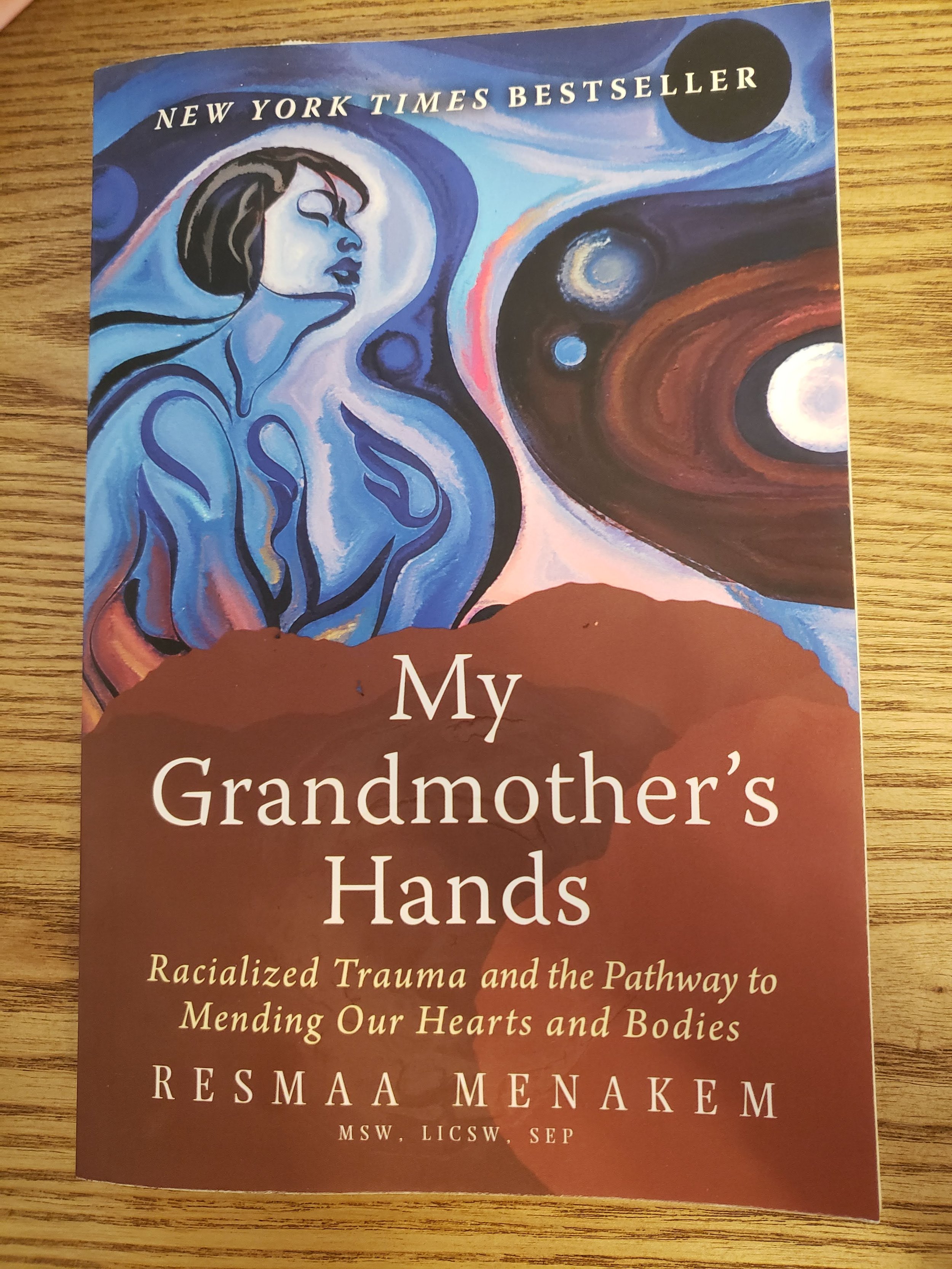Can I Find Empathy When I Really (Really) Disagree? Pandemic Rage and Racialized Trauma
Image by Andi McLeish
I’m angry. Sometimes I’m despairing or anxious, but mostly I’m angry. And I know I’m not alone. At this particular moment of the pandemic, into a third year of variants, restrictions, and confusing health advice, not to mention climate disasters and everything else going on, a lot of us are angry.
When we’re angry we want someone to be angry at. I’ve got people in my life who believe things that are very, very different from what I believe, and it would be very easy to be angry at them. But they are my friends, my family, my neighbors. Throughout this whole pandemic, I’ve felt confused about why some people—intelligent people who I respect—can hold opinions that are so different from my own.
I want to understand. I deeply believe that most people are good, trying their best, and working with the best information they have available at the time. So why is my information so different from theirs?
For me, empathy is a deeply spiritual practice. It’s a process of stepping into the shoes of another, of showing up without judgment to what’s happening emotionally in the moment, not only for the person I’m trying to empathize with, but for myself, too. This requires that I be able to feel my own feelings and take responsibility for them while opening to the feelings of the other. This is easy enough when I am with someone I love and share values with. It’s a more challenging practice when my reaction to this other person involves fear, hate, disgust, or confusion.
If I want to understand what all these other people are thinking and feeling, I first have to understand what’s going on with me. So I dig under the anger and find shame. The pandemic has been a lot, but what’s really gotten under my skin lately is the rise of racialized attacks on people of color. I am a white person witnessing other white people acting out in ways that I suppose I (wishfully) thought were disappearing. Something very old is getting triggered in our collective unconscious right now, and many of us (including me) are reacting to that. There are racialized traumas in our history that my ancestors were complicit in, if not actively perpetrating. I don’t want to think about that! Are you kidding me? Way easier to just be mad at someone else. Anyone else!
Full disclosure: I am pro-vaccine and pro-science. But it’s a privilege for me to feel that way. The scientific method is the best tool we have for learning about the world largely because it continues to test itself over and over again. But it’s also true that many of the conclusions the scientific community has come to have turned out to be wrong or so steeped in racial or gender bias that the results have harmed people. Scientists have historically been people with a lot of power in society. I haven’t always had the easiest time with the medical profession (my chronic illness was basically ignored until I found a naturopath who could treat me). Even still, people who look like me haven’t been experimented on or non-consensually sterilized by the medical community. I have good reasons to trust science. Other people have good reasons not to.
When I think about what I’m really feeling in this moment, what I tap into is hurt. It’s trauma. Gabor Mate is a famous doctor who specializes in trauma and the role it plays in sickness and addiction. He spoke up about the recent protests this way:
We're looking at a lot of traumatized people who are finding a political outlet for their mistrust and anger. It's nothing to do with the issue itself, it has to do with the issue acting as a flash point for their own unresolved traumatic imprints.
Yes, many of the individuals making noise right now have trauma in their past—lots of people do. But you know what else can be traumatizing? Living in a pandemic for three years. It’s been harder on some of us than others, for sure, but it’s been hard for everyone in different, constantly changing ways. The pandemic creates an excellent opportunity for trauma to express itself in our bodies: it’s massively scary, so our nervous systems naturally want to fight it or run away from it. You can’t fight a pandemic and there’s nowhere to go to get away from it. So these impulses get stuck in our bodies and can override our rational brains. For some of us, that means hiding under the covers, gnawing endlessly on our own anxiety (a frustrated attempt to flee). For others, it means getting into physical or online scuffles with whoever seems different enough to start a scuffle with (a frustrated attempt to fight).
In his fascinating book on racialized trauma called My Grandmother’s Hands, the psychologist Resmaa Menakem has written:
When one settled body encounters another, this can create a deeper settling of both bodies. But when one unsettled body encounters another, the unsettledness tends to compound in both bodies. In large groups, this compounding effect can turn a peaceful crowd into an angry mob.
Do you feel a bit like you’re in an angry mob right now? I feel like there’s an angry mob inside of me every time I read the news. And you know what’s not helpful when someone’s feeling angry? Telling them they are stupid and their feelings are wrong. When we’re hurting, we need to be seen and heard in that hurt. The bad news is, when everyone around is hurting, no one has the capacity to listen or hear.
So this could be a moment to take a little pause. Especially for me and my fellow white folk out there, this could be a good opportunity to take a breath and do a little trauma processing. Yes, plenty of white people have individual traumas in their lives—childhood neglect, alcoholism, sexual abuse, and many of the issues that can stem from poverty in a capitalist culture. But even without these experiences, white people also have intergenerational historical trauma from perpetrating and witnessing acts of violence against other white bodies as well as bodies of color.
Intergenerational trauma refers to the idea that the experiences of our ancestors are passed down along our family lines. Trauma is embedded in our DNA (see this fascinating study on mice who were born to fear the smell of cherry blossoms after their grandfathers were taught to fear it) as well as passed down through our behaviors. Menakem explains:
Well before the United States began, powerful white bodies colonized, oppressed, brutalized, and murdered other, less powerful white ones. The carnage perpetrated on Blacks and Native Americans in the New World began, on the same soil, as an adaptation of longstanding white-on-white practices. This brutalization created trauma that has yet to be healed among white bodies today.
White privilege is a thing. Most white bodies living today have not been directly oppressed by anyone because of their race or religion (though they certainly may have been oppressed in other contexts for other reasons). White privilege gives us a lot of entitlement and an expectation of freedom that other kinds of bodies do not always have access to. But that doesn’t mean we’re not hurting. It doesn’t mean we’re not massively messed up. It doesn’t mean we shouldn’t be looking at ourselves and healing our own crap before we take it out on someone else. Menakem explains,
After months or years, unhealed trauma can appear to become part of someone’s personality. Over even longer periods of time, as it is passed on and gets compounded through other bodies in a household, it can become a family norm. And if it gets transmitted and compounded through multiple families and generations, it can start to look like culture.
Having trauma, just to be clear, is not an excuse for being an asshole. It never was. Trauma is at the same time not your fault and also your responsibility to heal. When we have unresolved trauma, we often try to “blow it through” other bodies, in Menakem’s words—we pass on the trauma rather than digesting it for ourselves, effectively making it contagious (and what a metaphor in a pandemic era!). When we can stop blowing our trauma through other bodies and metabolize it instead, we can go a long way towards healing ourselves and our communities.
Let me be clear: this sucks. The time and effort and discomfort it takes to process something that was never yours in the first place is fundamentally unfair. The process of becoming ready to take responsibility alone is its own healing journey that can take a really long time. I didn’t choose to be white, so I didn’t choose the perpetration and witnessing trauma that happened to my ancestors. I didn’t choose to benefit from white privilege. But I do. And it’s my responsibility to know that, to feel it and heal it in my body, and to do what I can to stop the pattern of compounding and passing on racialized trauma at least within my own body as much as I can (which is, of course, an ongoing process).
So if we understand that the people we disagree with are not (all) assholes or idiots, but people who are hurting just like us (whether in racialized or other ways), how does that change the way we understand what’s going on now? What might it look like to heal the trauma that is generating the energy for this moment of pandemic rage? How do we deal with it when trauma shows up at our doorstep as a neighbor, a friend, or a family member triggering our oldest subconscious hurts? How do we halt racialized attacks on people of color altogether and like…stop having Nazis?!
Well, I don’t have an easy answer to that one. But I can do my own work. I can take responsibility for how all these feelings are showing up in my own body. I can try my best to find the healing capacity that comes through empathy.
It’s not a quick solution, but if each of us takes the time to learn to settle our bodies and process our own traumatic pasts, our bodies can calm down and move away from automatic trigger reactions. Settled bodies can help to calm unsettled bodies. Every time we can maintain our own calm, we can help the other bodies around us do the same. Then the healing becomes contagious.




